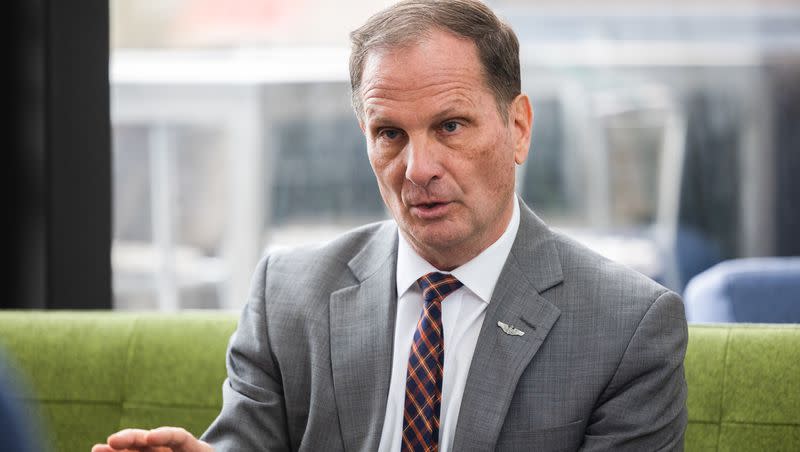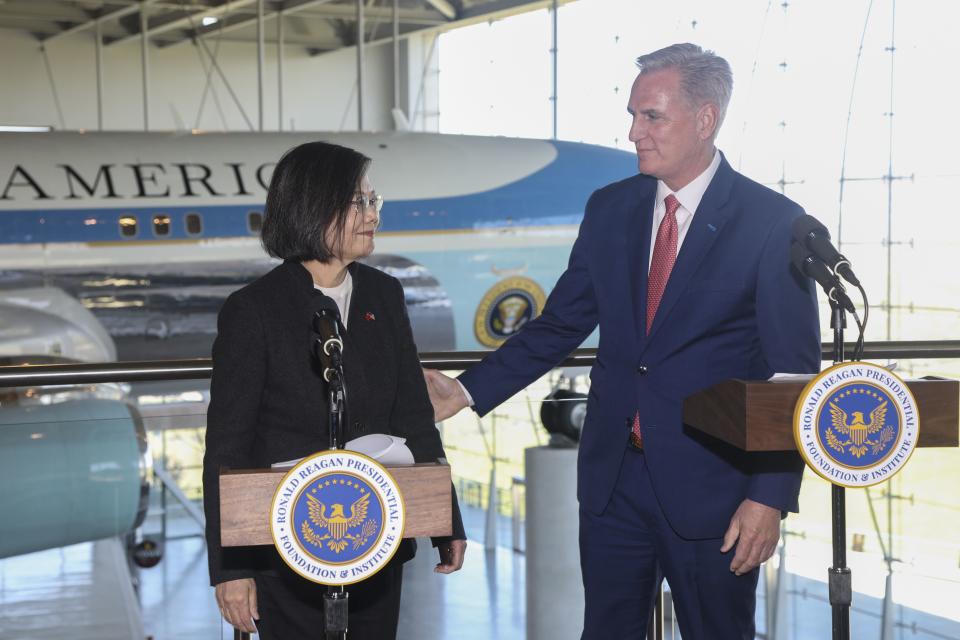Congressmen wary of China’s increased aggression say Utahns need to be cautious

- Oops!Something went wrong.Please try again later.
- Oops!Something went wrong.Please try again later.
- Oops!Something went wrong.Please try again later.
- Oops!Something went wrong.Please try again later.
Several Utah congressmen have recently raised concerns over reports of China’s attempts to gain influence in Utah and with other state and local governments, and over recent news involving Taiwan.
2nd District Rep. Chris Stewart told the Deseret News he is worried Utahn’s hospitable culture makes the state “vulnerable” to potential actions by the Chinese government.
“We always expect the best in people and see the good in people. Sometimes that makes us not fully aware of the nefarious motives of others,” he said, reflecting on The Associated Press’ story on how China has apparently sought to influence Utah’s elected officials.
Last week, 1st District Rep. Blake Moore also raised a warning to the Beehive State’s business community over the economic leverage China could wield over Utahns.
Additionally, House Speaker Kevin McCarthy joined a bipartisan group of congressmen, including Utah Rep. John Curtis, to meet with Taiwan’s President Tsai Ing-wen in California, leading to backlash from China.
Curtis, who speaks Mandarin, had met with Tsai previously when he led a congressional delegation to visit the island last December.
The historic visit marked the first meeting of a sitting Taiwanese president and the current Speaker of the U.S. House of Representatives on American soil since the U.S. broke off official diplomatic ties with Taiwan in the late 1970s.
Long time no see, Madame President. Grateful to @SpeakerMcCarthy for bringing a bipartisan group of Members together to show our unity in support of Taiwan. pic.twitter.com/r98sz0X86h
— Rep. John Curtis (@RepJohnCurtis) April 6, 2023
McCarthy hosting Tsai upset Chinese officials, who claim the island nation as their own as part of Beijing’s “one-China” policy. After Tsai’s visit the Chinese military conducted three days of large-scale combat readiness exercises, nearly surrounding Taiwan.
Chinese military officials said Monday their troops are ready to “fight at any time to resolutely smash any form of ‘Taiwan independence’ and foreign interference attempts.”

Stewart reflects on the AP investigative story
Stewart said he has been warning elected officials for years over China’s apparent influence campaigns in the state of Utah. He said Utahns need to handle interactions with the Chinese, whether they be business or government relationships, with “eyes wide open.”
The AP story said that although China’s local diplomacy with American states and cities is common, Beijing’s success influencing Utah lawmakers has been noteworthy. The article references multiple trips to China by some of Utah’s elected leaders at the request of the Chinese government.
Stewart cautioned against travel to the country without fully understanding the risks.
“You have to know that almost certainly your personal phone and computer will be violated and will probably be implanted with devices to allow them to monitor you,” he said. “This isn’t like taking your children to Disneyland for the weekend, a trip to China is something very different.”
A spokesman for the Chinese embassy in Washington told the AP that China “values its relationship with Utah” and any “words and deeds that stigmatize and smear these sub-national exchanges are driven by ulterior political purposes.”
Stewart, who sits on the House Intelligence Committee, said Utahns should view China as “a peer competitor” but also as “a pure competitor.”
He said he believes a trade relationship between China and Utah can be navigated but only with full knowledge of any potential dangers it can hold. “The more wide-eyed and clear minded we are about that the better we will be able to protect our own interests and our own security,” he said.
“We can be warm and embracing to people on a personal level, whether they’re from China, Taiwan, Africa, Europe or anywhere else. But at the same time we must recognize the reality that the Chinese Communist Party has no friendly interests beyond its own power,” he said.

Moore calls for Utah businesses to mitigate risk exposure in China
Moore joined Miles Hansen of World Trade Center Utah at the U.S. Global Leadership Coalition panel in Salt Lake City to discuss trade dynamics with China.
Hansen, who perviously served with the National Security Council in former president Donald Trump’s White House, said he doesn’t like to promote fear mongering but, “the reality of the situation is that tensions are increasing dramatically.”
Hansen said he has been asking Utah businesses to consider strategies they can implement now in case of possible economic tumult caused by geopolitical tensions in the future.
According to the U.S. Global Leadership Coalition, Utah accounted for more than $18 billion in global exports in 2021. The coalition also said more than 400,000 jobs in Utah are supported by international trade with more than 3,500 Utah businesses, most of them small or medium-sized businesses, exporting goods around the world.
WATCH NOW: Join us virtually for a conversation in Salt Lake City, Utah @RepBlakeMoore, @GeneralRBNeller, and @WTCUtah’s @MilesHansen on what American global leadership is worth to Utah. https://t.co/GfzUXEQng1
— USGLC (@USGLC) April 4, 2023
Moore said he recently had a Utah manufacturer that is dependent on trade with China ask him what they should do in regards to developing tensions.
“‘If (U.S.-China trade relations) go belly up my business is totally affected and I don’t know how to navigate it,’” Moore said the business leader told him.
Moore and Hansen discussed steps each company should consider as part of their business strategy, including diversification of business operations.
While they said calls for 100% decoupling of the U.S. economy from China are “not realistic,” they believe businesses that implement prudent strategies to mitigate risk will be better off.
Moore said some Utah businesses are taking advantage of a long-running U.S. trade program called the Generalized System of Preferences, or GSP, that promotes manufacturing in other friendly-developing countries by eliminating import trade duties on some of their products.
He encouraged Utahns to utilize these programs when diversifying their business’ foreign trade exposure.
The panel said Utah businesses’ strategic restructuring of its international trade can set an example for the rest of the nation on how to prepare for eventualities with China.
“I love that the Utah community is onboard,” Moore said.
He said Utah benefits from a congressional delegation that has long been preparing the business community for potential foreign market challenges.
“You have a delegation that cares deeply about this issue and is engaged fully on these matters,” Moore said.

